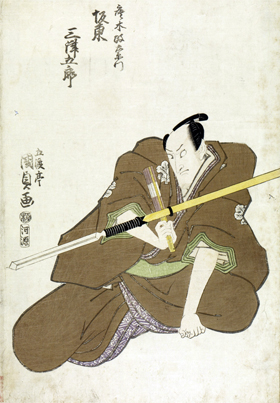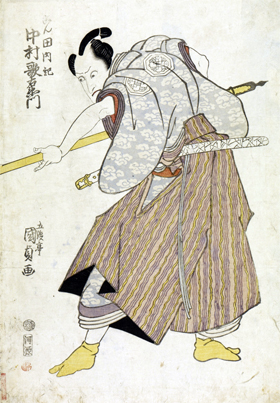| HďSHO JIAI |
| Play title | Igagoe D˘chű Sugoroku Igagoe Norikake Gappa |
||||||||||||
| Common title | H˘sho Jiai |
||||||||||||
| Authors | Chikamatsu Hanji, Chikamatsu Kasaku ("Igagoe D˘chű Sugoroku") Nagawa Kamesuke I ("Igagoe Norikake Gappa") |
||||||||||||
| History |
The play "Igagoe D˘chű Sugoroku" was originally written for the puppet theater (Bunraku) and staged for the first time in the 4th lunar month of 1783 in ďsaka at the Takemotoza. The authors drew their inspiration from Nagawa Kamesuke I's successful drama "Igagoe Norikake Gappa", which was directly written for Kabuki and was staged for the first time in the 12th lunar month of 1776 in ďsaka at the Naka no Shibai [casting]. "Igagoe D˘chű Sugoroku" was adapted for Kabuki the same year and staged for the first time in the 9th lunar month of 1783 in ďsaka at the Naka no Shibai [casting]. This play is based on the famous Igagoe vendetta, which took place in 1634. When it was dramatized, the names and details, and even the era were changed because of censorship by the ruling Tokugawa Shogunate:
|
||||||||||||
| Structure |
"Igagoe D˘chű Sugoroku" is made up of 10 acts. "H˘sho Jiai" is the second scene of the fifth act. |
||||||||||||
| Key words |
Adauchi Daimy˘ Gidayű Ky˘gen Giri/Ninj˘ H˘sho Igagoemono Jidaimono Katakiuchi Kenjutsu K˘riyama-han K˘riyama-j˘ Sandai Adauchi Seppuku Shinkage-ryű Yamato K˘riyama |
||||||||||||
| Summary |
Act V, scene 2: Hondake J˘chű The scene is set within the K˘riyama Castle. Contrary to the expectations of the assembled spectators, Karaki Masaemon loses the scheduled duel with Sakurada Rinzaemon [1], so that Honda Dainaiki [2], the daimy˘ of the K˘riyama Domain, denounces him for his incompetence, and Sakurada scoffs at him for not living up to his reputation. In the meantime, Usami Goemon, who has acted as judge, puts his hand to his sword to commit suicide (seppuku), but Dainaiki stops him, ordering him to retire and wait until further orders from him. Then, after sending the victorious Sakurada into the castle for a celebration party, he thrusts his spear at Karaki, forbidding him to leave the site. Karaki counters barehanded. Then although it is unthinkable that a retainer would attack his lord, he takes a roll of paper (h˘sho) from the mouth of a jug of wine in the altar, and parries the lord's thrusts with it. In the process, he purposely goes through several techniques, which are the ultimate points of his fencing craft as he is a member of the famous Shinkage School. The lord realizes instantly that Karaki is giving him a final and very superior fencing lesson. Honda Dainaiki says that he consents to Karaki's desire, revealing that he has heard all from Wada Shizuma, and is aware of Karaki's wish to aid Shizuma in gaining revenge for his father's death. He presents Karaki with a gift of a sword, and wishes him luck. A retainer comes to say that Sakurada has suddenly and hastily departed. Dainaiki recalls that Sakurada was the enemy Sawai Matagor˘'s uncle, and realizes that Rinzaemon may have gone off to warn Matagor˘. |
||||||||||||
| Notes |
[1] Sakurada Rinzaemon or Sakurai Rinzaemon. [2] Honda Dainaiki, Honda Naiki, Konda Dainaiki or Konda Naiki. |
 |
 |
|
The actors Band˘ Mitsugor˘ III and Nakamura Utaemon III playing the roles of Karaki Masaemon and Honda Dainaiki in the drama "Igagoe Norikake Gappa", which was staged in the 8th lunar month of 1814 at the Nakamuraza (print made by Utagawa Kunisada I) |
|
|
|
| Contact | Main | Top | Updates | Actors | Plays | Playwrights | Programs | Links | FAQ | Glossary | Chronology | Illustrations | Prints | Characters | Derivatives | Theaters | Coming soon | News |